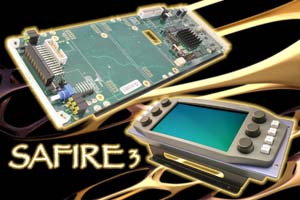UK-based Crystal Vision, will be demonstrating its flexible IP platform, the Marble-V1 media processor hardware and the initial six software apps which run on it.
 On stand 2.C28 at IBC 2018, UK-based Crystal Vision, will be demonstrating its flexible IP platform, the Marble-V1 media processor hardware and the initial six software apps which run on it.
On stand 2.C28 at IBC 2018, UK-based Crystal Vision, will be demonstrating its flexible IP platform, the Marble-V1 media processor hardware and the initial six software apps which run on it.
These apps are IP gateways between SDI and SMPTE 2022 or 2110, and IP to IP translators for making adjustments to IP flows including protocol conversion between ST 2022 and ST 2110. Amongst the full range of modular SDI interface and keying products on show will be the Safire 3 real-time chroma keyer, which now has five-year warranty benefits with a significant price drop, the release stated.
Crystal Vision’s IP products are software apps which run on Marble-V1 hardware, with apps that are bought with the hardware able to be replaced with different apps as needs change helping broadcast engineers to make the most of their budgets. Featuring a CPU/GPU processor that runs Linux and a Crystal Vision developed operating system layer which is the connecting fabric to the software-defined apps, Marble-V1 is a card housed in the Vision frame. It has six bi-directional SDI connections, four 10GbE SFP+ network interface ports, eight bi-directional discrete AES stereo channels and multiple referencing capabilities. The initial software apps SDI6-IP-2022, IP-SDI6-2022, SDI6-IP-2110 and IP-SDI6-2110 are IP gateways for the transport of uncompressed video over 10GbE IP networks, converting to and from SMPTE 2022 or SMPTE 2110. The IP to IP translator apps IP-IP-2022 and IP-IP-2110 can be used for network address translation, multicast to unicast address conversion, the creation of media firewalls and ST 2022 to ST 2110 protocol conversion.
The gateway and translator apps include support for 31 SDI video standards, redundant streaming, clean switching between flows, sophisticated synchronising, PTP reference, video delay, unicast and multicast transmission, signal and flow monitoring, traffic shaping and features to ensure network security. Additional features on the 2110 apps include support for AES67 (including the input or output of external digital audio via the DIOP8 piggyback), SDP reading and writing and AMWA NMOS IS-04 and IS-05.
The company will also demonstrate Safire 3 real-time chroma keyer, which is now the lowest cost of the industry’s best real-time chroma keyers following a significant price drop, the release stated. With its advantages including Crystal Vision’s responsive technical support and five-year warranty, Safire 3 is reportedly suited for applications from weather to immersive virtual studios, with an intuitive workflow for setting up a key, support for resolutions from SD to 1080p and features such as lighting compensation, colour correction and video delay.
Enhancements over the last year include new colour spill processing, as well as improved live operation following changes made to the VisionPanel control panel. The new price makes it easier for large broadcasters to justify a chroma keyer on each camera which gives the most flexible system when using a virtual set that works from different camera angles. For smaller broadcasters who previously had to rely on the lower quality chroma keyers in their studio mixers, the new pricing allows them to have better quality keying, the release stated.
With some broadcasters expressing general concerns about being hacked, Crystal Vision will be showing the increased security it has recently added to its Indigo and Vision frames including the ability to prevent access to the frames via FTP, SSH, HTTP, SNMP and ASCII control protocols.
Also available on Stand 2.C28 will be highlights from Crystal Vision’s range of SDI interface, including up and down converters, logo keyers, video delays, fail-safe routing switches, synchronisers, colour correctors, audio embedders and fibre transmitters and receivers.















































































